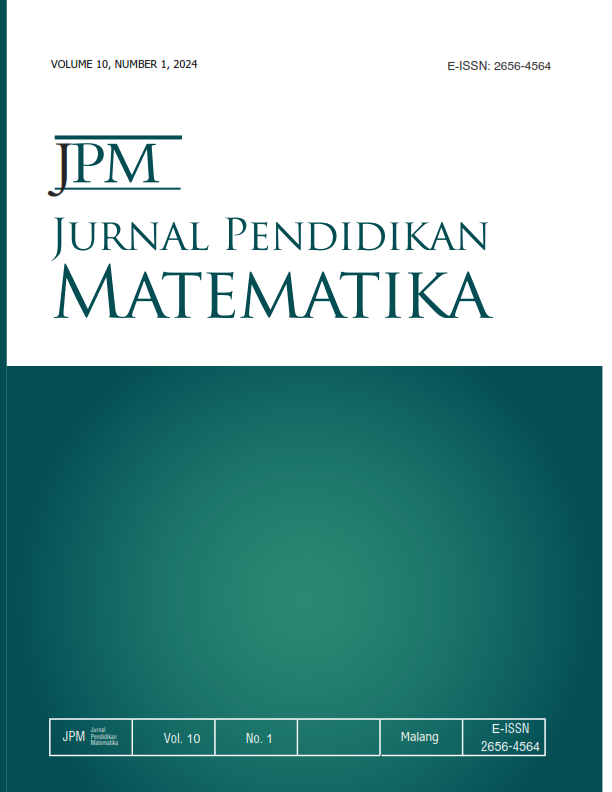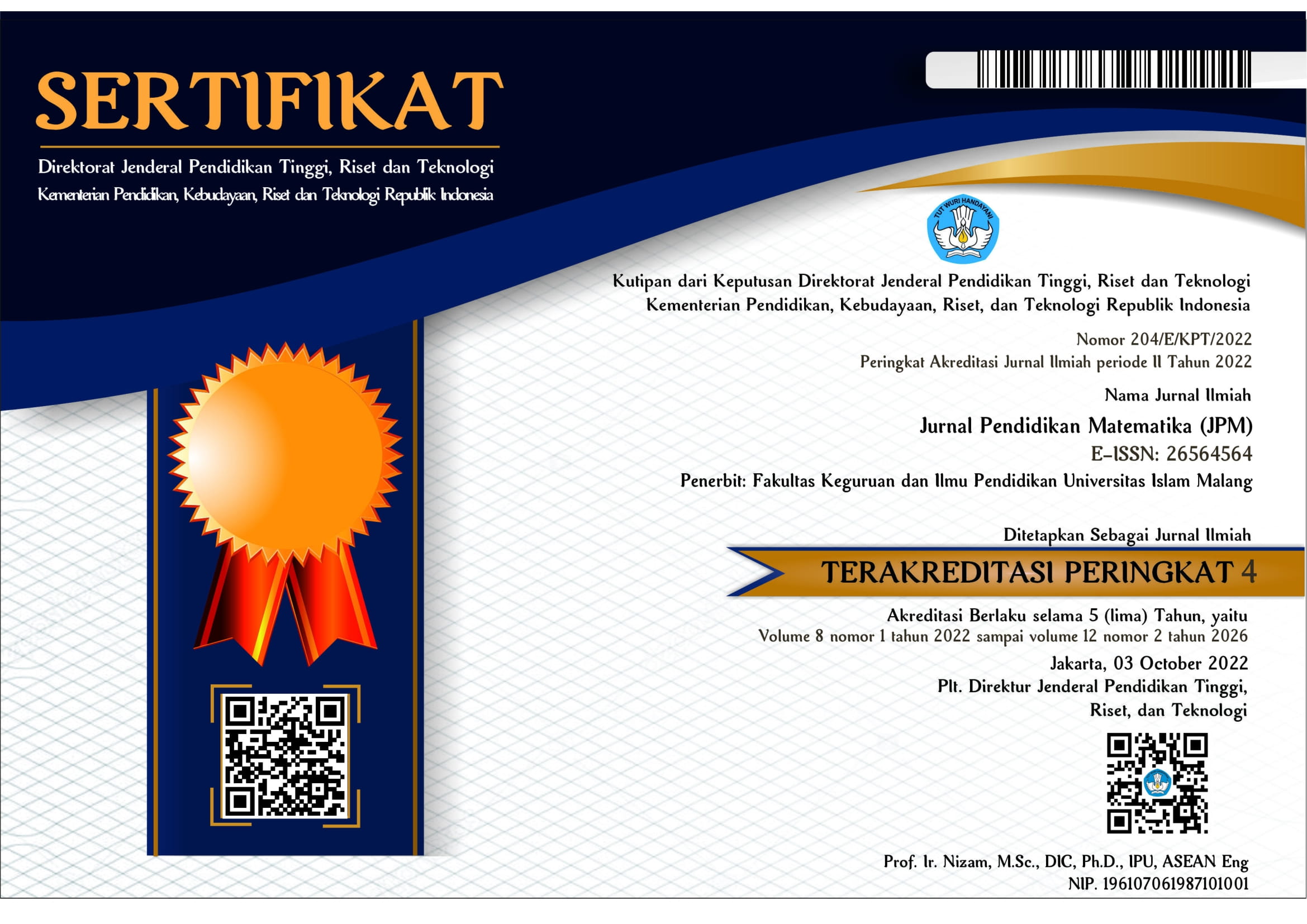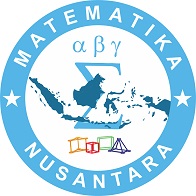An Analysis of Students' Critical Thinking Abilities in Solving Problems Social Arithmetics Junior High School
DOI:
https://doi.org/10.33474/jpm.v10i1.20497Keywords:
Critical Thinking Skills, Problem-Solving, Social ArithmeticAbstract
Critical thinking skills are necessary because Critical thinking is a form of high-level thinking ability that all students must have, especially in learning mathematics. However, students' Critical thinking skills are honed less during the learning process. Teacher efforts to facilitate students to practice Critical thinking skills are indispensable. So that teachers need a picture of the ability to think critically as a reference to train these skills. To that end, the study aims to describe students' thinking skills in solving social arithmetic problems, especially single-interest matters. This type of research is descriptive qualitative research. The subject of this research is PTS students for the odd semester of the 2020/2021 class VII academic year from a state junior high school in Sleman district. The instruments of this research are problem-solving questions as well as observations and interviews. The results of the research show that the three students have high critical thinking abilities because they can fulfill all indicators of critical thinking abilities in solving single-interest problems. Where all indicators of critical thinking abilities can be met by the three students with varied problem-solving processes.
References
Abdurahim, A. (2016). The effectiveness of the rehearsal learning model is seen in the attitudes, motivation, and mathematical critical thinking abilities of junior high school students. Journal of Mathematics Education Research, 3(2), 137-149.
Agus, I. (2019). The effectiveness of guided discovery using a contextual approach is seen from critical thinking skills, achievement and self-efficacy. Journal of Mathematics Education Research, 6(2), 120-132.
Almulla. (2018). Investigating Teachers' Perceptions of Their Own Practices to Improve Students' Critical Thinking in Secondary Schools in Saudi Arabia. International Journal of Cognitive Research in Science, Engineering and Education, 6(3), 15-27.
Asmar, A., & Delyana, H. (2020). The relationship between independent learning and critical thinking skills through the use of Geogebra software. AKSIOMA: Journal of the Mathematics Education Study Program, 9(2), 221-230.
Azizah, I.N., & Widjajanti, D.B. (2019). The effectiveness of project-based learning is seen from learning achievement, critical thinking abilities, and student self-confidence. Journal of Mathematics Education Research, 6(2), 233-243.
Demirci, F., & Özyürek, C. (2017). The Effects of Concept Using Cartoons in Astronomy Subjects on Critical Thinking Skills among Seventh Grade Students. International Electronic Journal of Elementary Education, 10(2), 243-254.
Farib, P.M., Ikhsan, M., & Subianto, M. (2019). Junior high school students' mathematical critical thinking process through discovery learning. Journal of Mathematics Education Research, 6(1), 99-117.
Firdaus, A., Nisa, L.C., & Nadhifah. (2019). Students' critical thinking skills in sequence and series material based on thinking styles. KREANO: Journal of Creative-Innovative Mathematics, 10(1), 68-77.
Gardner, H. (1993). Multiple Intelligences. New York: BasicBooks.
Hardiyanto, W., & Santoso, R.H. (2018). The effectiveness of PBL settings in TTW and TPS is seen from students' learning achievement, critical thinking and self-efficacy. Journal of Mathematics Education Research, 5(1), 116-126.
Hidayat, W., & Sari, V.T.A. (2019). Mathematical critical thinking abilities and adversity quotient of junior high school students. Journal of Elements of the Mathematics Education Study Program, 5(2), 242-252. DOI: 10.29408/jel.v5i2.1454
Lovász, L., Pelikán, J., & Vesztergombi, K. (2003). Discrete Mathematics: Elementary and Beyond. New York: Springer
Miatun, A., & Khusna, H. (2020). Mathematical critical thinking skills based on mathematical disposition. AKSIOMA: Journal of the Mathematics Education Study Program, 9(2), 269-278.
Mujib. (2016). Develop critical thinking skills through improve learning methods. Al-Jabar: Journal of Mathematics Education, 7(2), 167 – 180.
Muslimahayati. (2020). Development of critical thinking skills questions based on local wisdom of South Sumatra on trigonometry material. AKSIOMA: Journal of the Mathematics Education Study Program, 9(1), 12-20.
Peter, E.E. (2012). Critical thinking: essence for teaching mathematics and mathematics problem solving skills. African Journal Mathematics and Computer Science Research, 5(3), 39-43.
Popp, W. (1975). History of Mathematics. England: The Open University Press.
Purwati, R., Hobri, & Fatahillah, A. (2016). Analysis of students' critical thinking abilities in solving quadratic equation problems in creative problem solving model learning. Kadikma, 7(1), 84-93.
Putri, A., Sumardani, D., Rahayu, W., & Hajizah, M.N. (2020). Mathematical critical thinking skills using generative learning and connecting, organizing, reflecting, extending (CORE) models. AKSIOMA: Journal of the Mathematics Education Study Program, 9(1), 108-117.
Safitri, M., & Aziz, M. R. (2023). Design of Realistic Mathematics Education Digital (RMED) in Era Society 5.0. Jurnal Pendidikan Matematika (JPM), 9(1), 8–14. https://doi.org/10.33474/jpm.v9i1.19358
Salim, S., & Maryanti, E. (2017). Development of mathematics learning tools through cybernetic learning theory assisted by derive software. Journal of Mathematics Education Research, 4(2), 229-238.
Schoenfeld, V.H. (1985). Mathematical Problem Solving. Florida: Academic Press.
Setyaningsih, T.D., & Abadi, A.M. (2018). The effectiveness of PBL in a collaborative setting is seen from algebra learning achievement, critical thinking abilities, and student anxiety. Journal of Mathematics Education Research, 5(2), 190-200.
Sulistyorini, Y., & Napfiah, S. (2019). Analysis of students' critical thinking abilities in solving calculus problems. AKSIOMA: Journal of the Mathematics Education Study Program, 8(2), 279-287.
Ucisaputri, N., Nurhayati, & Pagiling, S.L. (2020). The influence of a scientific approach on critical mathematical thinking skills in students at SMP Negeri 2 Merauke. AKSIOMA: Journal of the Mathematics Education Study Program, 9(3), 789-798.
Winarso, W., & Dewi, W.Y. (2017). Students' critical thinking is seen from the visualizer and verbalizer cognitive styles in solving geometric problems. Beta Tadris Mathematics Journal, 10(2), 117-133.
Yanti, O.F., Prahmana, R.C.I., & Fitriyah. (2018). Single subject research: Pythagorean learning among introverted students in class VIII. Beta: Journal of Tadris Mathematics, 11(1), 37-49.
Yılmaz-Özcan, N., & Tabak, S. (2019). The Effect of Argumentation-Based Social Studies Teaching on Academic Achievement, Attitude and Critical Thinking Tendencies of Students. International Electronic Journal of Elementary Education, 12(2), 213-222.
Zetriuslita, Wahyudin, & Dahlan, J. A. (2018). Association Among Mathematical Critical Thinking Skill, Communication, and Curiosity Attitude as The Impact of Problem-Based Learning and Cognitive Conflict Strategy (PBLCCS) in Number Theory Course. Infinity: Journal of Mathematics Education, 7(1), 15-24.
Downloads
Published
How to Cite
Issue
Section
License
Copyright (c) 2024 Marfilinda Atma Sari Subekti, Sisi Pitriyana

This work is licensed under a Creative Commons Attribution 4.0 International License.






_-_Copy.jpg)
.jpg)
.jpg)










